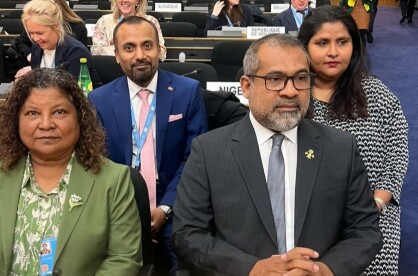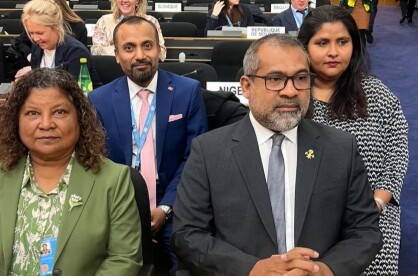Democracy hijacked: JSC edition
Instead of being the great equaliser that it was promised it would be, the institution has tipped the balance in the favour of other state institutions.

Instead of being the great equaliser that it was promised it would be, the institution has tipped the balance in the favour of other state institutions.

The Maldives is a comparably young democracy. A lot of trial and error is to be expected when developing a system of governance that is truly inclusive, fair, and balanced, and to achieve this end the Maldivian people had put their trust in MDP. Yet, the ‘monarchy-esque’ system of today begs a lot of questions.
Article 7 of the Maldivian Constitution of 2008 dictates proper separation of powers, yet few truly understand what this entails. The three powers in a nation are the Legislature, which includes the parliament and other offices that work to develop the laws, the Judiciary, which includes all levels of courts, tribunals, and other offices charged with executing sentencing in accordance to the laws passed by the Legislature, and then the Executive, which is the President, their ministerial cabinet, the police, and local government authorities, with the responsibility of administering the country as well as enforcing the rulings of the judiciary.
One of the bigger campaign promises made by the current administration on their road to a 'more democratic leadership' included the reformation of the judiciary and limiting the overwhelming powers of the Supreme Court. The Judicial Services Commission was the brainchild of the MDP manifesto as a way to curb this power, by taking the position of overseer and other key administrative privileges of the Department of Judicial Administration which was being run by the Supreme Court Judges. This act, on paper, sounded like the proper check and balance needed to ensure proper justice is delivered, yet, in action, the balance seems to be sorely tipping to one side.
Former President Nasheed, retook a position of power by riding on the coattails of the MDP elected, and, with his formerly overwhelming popularity, secured the position of Speaker of Parliament for the current sessions. His word is sacred in the party that is currently in governance, is enough to sway voters substantially, and this influence, without question, seeps into the executive. While a casual observer might notice the melding of two branches of power, namely the executive and the legislative, this is to be somewhat expected in a fledgling democracy. One would assume that, until leadership is ingrained and opportunities open for the upcoming generation, incumbent influential personalities would sit at the head of the table, with the responsibility of nurturing new leaders. However, instead, power only begets power.
With the formation of the Judicial Services Commission, the overseer of the judiciary, vested with the powers to appoint, dismiss, and even ‘promote’ judges, one of the member chairs is currently being warmed by none other than Speaker Nasheed.
Before going any further, it is important to understand the JSC. The primary functions of the Commission are to;
The membership of this commission’s board is questionable. Why does the Speaker of the legislature, one whose job is to be impartial in the running of the parliament sessions — one who constantly attempts at influencing not only internal policies and administration but even foreign policy by voicing opinions and information beyond their purview — get to decide and influence the administration of the pantheon of justice?
Beyond that, the President of the board hails from a law firm that is not only active but hugely so — this is much like a referee of a football match being a player for one of the competing teams. On top of that, the overwhelming power through the loopholes in the formation of the JSC has allowed judges to be suspended mid-sentencing, so to speak, which is an influence on judicial proceedings. They can even conduct actions that look quite similar to being rewards for judges, such as the promotion of the second judge who concluded former President Yameen’s sentencing — after the previous judge was suspended during sentencing — to the supreme court shortly afterwards.
An overseer is not a controller. A check and balance system ensures accountability rather than overruling, and the JSC as it stands right now seems to be doing some overruling. Further cases that come to mind when speaking of incomplete justice include that of the Former MP and Minister, Ali Waheed, and finally, the case of sexual assault upon a foreign national on a safari boat involving the husband of a parliament member. If such high profile cases seem to not follow through to logical conclusions yet veer on the side of corruption, then what does the JSC truly do when it comes to being an institution for administration and fairness? Where is the line drawn?
Lines separating the bodies of power in the Maldives seem to be getting blurrier by the year, and this administration as well as the party that led to their election, needs to account for the promises made beforehand. By warming the seats built to establish order and equality, those who stand in the way of justice for personal gain only sow more and more distrust in the people for the system. Once the people lose faith in the system, that faith would be hard won. This is why now more than ever, the nation needs more fresh faces, educated, aware, and young individuals with the courage to face issues and fix them rather than sidestep them.



